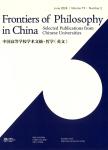Was Wittgenstein an Analytic Philosopher? Wittgenstein vs Russell
Was Wittgenstein an Analytic Philosopher? Wittgenstein vs Russell作者机构:M204: Philosophy The University of Westem Australia 35 Stirling Highway Crawley PerthWA 6009 Australia
出 版 物:《Frontiers of Philosophy in China》 (中国哲学前沿(英文版))
年 卷 期:2016年第11卷第1期
页 面:35-53页
学科分类:01[哲学] 0101[哲学-哲学] 06[历史学] 060207[历史学-专门史] 010108[哲学-科学技术哲学] 0602[历史学-中国史]
主 题:Wittgenstein Russell clarity relations propositions unity
摘 要:This article is in six main sections. In the first three sections, some indication of how and why philosophers have differed in their response to the title question is given by describing Wittgenstein's encounters with Carnap, and by examining Wittgenstein's commitment to clarity and argument in philosophy, illustrating this commitment by reference to his Philosophical Investigations discussion of the will. In the remaining three sections, Russell is taken as a paradigm example of a central kind of analytic philosopher. The answer to the title question is unfolded by sketching Wittgenstein's and Russell's treatments of a few philosophical topics and problems, focusing on theories and questions surrounding propositions, judgments, and their constituents, in particular Russell's multiple relation theory of judgment and the question of the unity of the proposition. This approach displays, and does not merely assert, Russell's deployment of (sometimes repeated variants of) technical solutions to philosophical problems and how that deployment contrasts with Wittgenstein's attempts to make such problems disappear.



